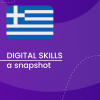Digital Care I Claim II: Actions to acquire technological equipment in the educational community
Digital skills are a valuable asset of life for all, in the era of the global knowledge society. On the other hand, faced with the need for social distancing due to the COVID-19 pandemic, schools have taken the lessons through distance learning. However, low-income families and teachers who did not have the necessary technological equipment had considerable difficulties in participating effectively in distance learning.
Given the above need and in the context of the digital transformation of education, the Digital Access actions were implemented in 2021-2022. They concerned the issuing of cheques worth two hundred (200) euros for pupils and students meeting specific income and social criteria, in order to acquire the necessary technological equipment, such as portable tablets, laptops, desktops and optionally, some peripherals.
Objective of the programme
Their main focus was to strengthen the educational process through modern digital means that can be used in either distance learning (distance learning) or face-to-face learning. In addition, the initiative aimed at facilitating access to digital educational material for teachers and students, while enhancing their digital skills. In this way, the educational community could enjoy a more sophisticated and effective educational environment.
Target group
The Digital Care II Programme reinforced:
- Families of a specific income group with dependent children or children under guardianship, who are pupils and students aged between 4 and 24 years of age, who attend a public education facility in Greece;
- Teachers teaching in educational structures in the country, both public and private;
- Families whose minor children attend educational facilities in areas affected by the fires between 27.7.2021 and 13.8.2021 inclusive.
Bodies involved: source of funding and statitical data
The programme was implemented by the Information Society S.A. on behalf of the Ministry of Education and Religious Affairs and was supported by the Ministries of Finance, Development and Investment, Labour and Social Affairs and Digital Governance. It was carried out as part of the National Recovery and Resilience Plan ‘Greece 2.0’ financed by the European Union – NextGenerationEU.
The application procedure was very straightforward as via the Single Digital Portal of the Greek State, gov.gr, the interested parties submitted their application online. The result of the action is over 470.000 pupils and students have already acquired technological equipment (tablet, laptop, desktop).
Why is it a good practice?
Digital Care II actions enabled pupils and students to acquire the necessary technological equipment and increased their contact with new technologies at school, thereby ensuring their participation in the digital transformation of education. At the same time, special provision was made for the most vulnerable groups in society and the needs of teachers working in public or private schools were met with special assistance.
The overall investment aimed at:
- Eliminating inequalities among students when upgrading digital skills to benefit equally from the ongoing digital transformation of the education process by gaining access to the knowledge and skills needed in the global, knowledge-based economy.
- Empowering teachers in order to respond effectively to the challenges of the digital transformation that accelerated in particular during the COVID-19 pandemic period.
They have been instrumental in building the experiential familiarisation of the education community with new technologies, and the achievement of distance learning at a time that was necessary for the continuation of the educational process. Finally, they are part of the strategic planning of the Ministry of Education, Religious Affairs, to achieve an inclusive digital education model.
Information was extracted from the websites of the KT AE and the Ministry of Education of Religious Affairs.




